BANK OF ALBANIA
PRESS RELEASE
Governor Sejko: Address at the launching ceremony of the Money Week
Publication date: 18.03.2024
Honourable Minister of Education and Sports,
Dear Chairman of the Albanian Association of Banks,
Dear students and teachers, friends and banker colleagues,
I am delighted to welcome you as every March to the launching of Global Money Week – a worldwide initiative that, since 2012, has been encouraging us in joining our efforts to enhance public awareness on the crucial role of financial education for our younger generations.
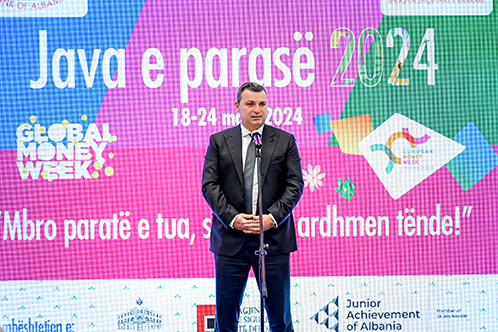
This campaign represents a great opportunity for policy-makers, the educational system, the banking sector, and businesses to collaborate with the aim of reaching out to young people to teach them about the importance of money, planning, and making sound financial decisions. It's time for children and young people to actively learn about money and finances, gradually acquiring the knowledge, skills, attitudes, and behaviours necessary to ensure financial well-being and stability.
This ultimate goal of Global Money Week has acquired international support, with over 40,000 entities across government and civil society, under the OECD-INFE's guidance[1], reaching approximately 120 million individuals in 176 countries last year alone. This figures, alongside with the growing involvement of Albanian pupils and students, encourages and inspires us to provide an ever increasingly number of activities, competitions, educational lessons, and to deepen our collaborative efforts with bankers, educators, pupils and students alike.
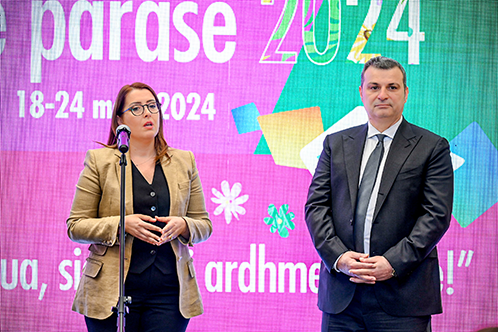
This year's theme, "Protect your money, secure your future” highlights the necessity for a responsible and informed approach to managing personal finances, including the identification and understanding of potential risks of financial transactions. It is crucial for young people to identify risks associated with online scams, as well as other risks stemming from unreliable information and advice. To this end, the Bank of Albania, together with its partners, will be organizing a series of educational programs and activities nationwide, aimed at equipping youth and children with the tools needed to navigate the financial world safely.
In today's digital era, young individuals are frequently exposed to financial advice, advertising, and investment opportunities through social media and their peer networks. It's crucial to comprehend that financial market participation, even in its most basic forms, carries broader economic implications. The innovative investment methods and payment instruments can enhance efficiency and reduce costs for consumers. They indeed open many doors to the future, yet they also introduce risks if not accompanied by sufficient financial literacy and appropriate market regulation and supervision.
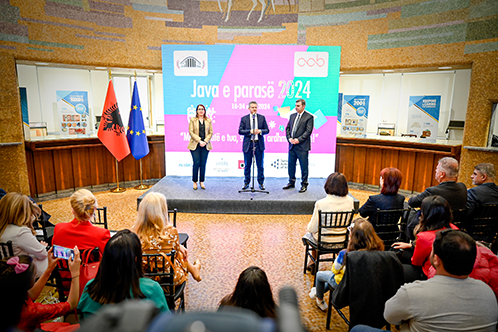
Instances of occasional successful investments in unregulated products should not be seen as indicators of future or sustainable success. It’s important to emphasise that these can pose significant risks when conducted within markets that lack regulation and supervision.
Recent global challenges, including the pandemic, conflicts/ war, and climate change, have underscored the importance of informed and secure financial decision-making, not only for personal financial health but also for the broader financial system's stability. The swift pace of digital transformation and the urgent issues raised by climate change are reshaping our engagement with financial instruments and relationships. Young people have a unique opportunity to use their resources as a force to induce a positive change in both society and environment. Accordingly, the Bank of Albania has embarked on two significant strategies: 1. “The Strategy for the Management and Supervision of Climate-Related Financial Risks”; and 2. “The Strategy for Enhancing Financial Education and Inclusion”.
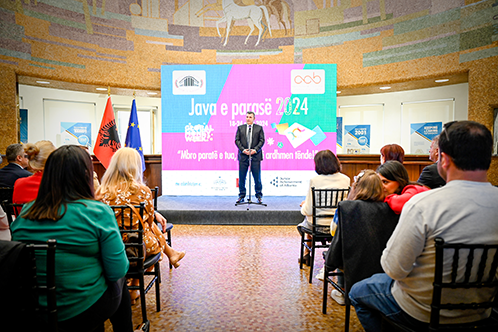
In the past decade, there has been a marked increase in academic research on financial education and inclusion, both globally and within our borders. Albanian research is largely driven by the Bank of Albania's efforts to gather insights and data. The insights collected from this research have informed the development of policies designed to meet contemporary needs. We now possess a rich pool of information that enhances our understanding of the factors influencing financial literacy across different demographics, including economic conditions, education, employment, digital access, and familial influence.
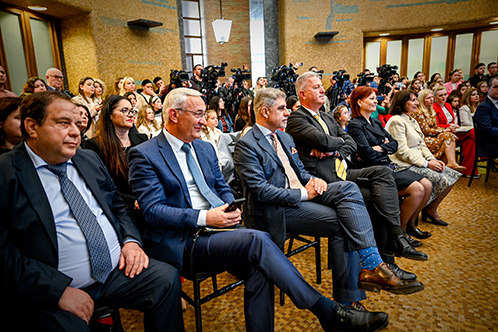
Owing to its initiatives, the Bank of Albania has observed a notable enhancement in financial inclusion. This is evidenced by a substantial increase in electronic payment transactions, which have reached approximately 48 million across both banking and non-banking platforms, marking a 26% rise from 2022. Also, the number of accounts accessible remotely increased by 24% in 2023, accounting for 34% of the total customer accounts in banks. However, innovations also bring new risks, such as online scams or what is known in financial language as phishing - a way of stealing identity that is carried out through the voluntary but uninformed provision of personal data, such as account numbers and passwords, which can then be used by wrongdoers for theft purposes.
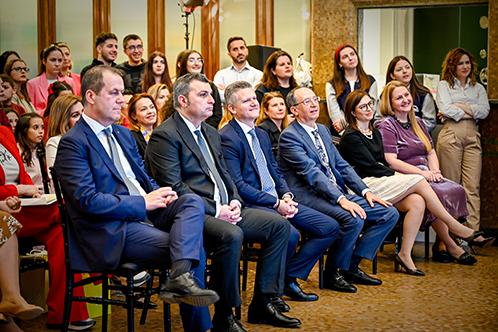
In response to these challenges, and to foster a culture of financial literacy, the Bank of Albania is implementing a comprehensive strategy for financial education and inclusion, which certainly is addressed to children and young people. This strategy, developed in collaboration with key stakeholders, like the Ministry of Education and Sports, the Albanian Bank Associations, the World Bank etc., aims to boost financial literacy across Albania.
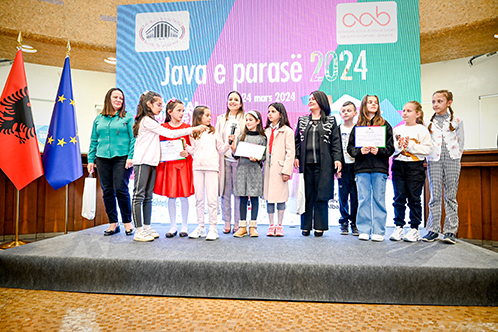
It serves as a blueprint for educational bodies, financial institutions, businesses, and NGOs to develop and implement collaborative policies, programs, and educational materials, ultimately enhancing the country's financial literacy. Advancing this initiative presents obstacles, thus there is a growing necessity of exchanging experiences and learning from one another to enhance and advocate for a stronger financial literacy in our country.

Engaging in discussions about money with our children is a simple yet effective way to cultivate financially aware individuals. Global Money Week plays a central role in initiating these crucial conversations, allowing young people and their families to explore fundamental financial concepts such as budgeting, saving, lending, and the implications of uninformed financial decisions.
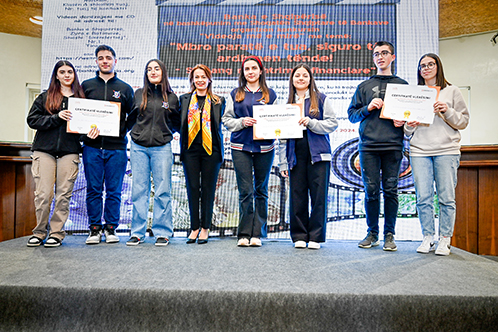
The financial landscape is evolving rapidly, technological advances are changing how children learn in every field. As we navigate a changing world, it is vital for young people to acquire the skills, knowledge, and confidence to manage their financial future in a responsible manner.
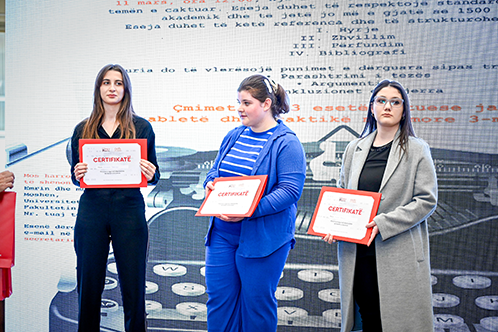
I take this opportunity, with the launching of Global Money Week 2024, to express my best wishes for the success of this campaign. Allow me to congratulate and thank the many students, pupils, and teachers who have joined us. I encourage new participants to actively engage, ask questions, and enjoy the learning experience. The Bank of Albania is proud to be the main local organizer of this global initiative, promoting significant changes in financial and digital inclusion, which have greatly increased the importance of financial education in our country.
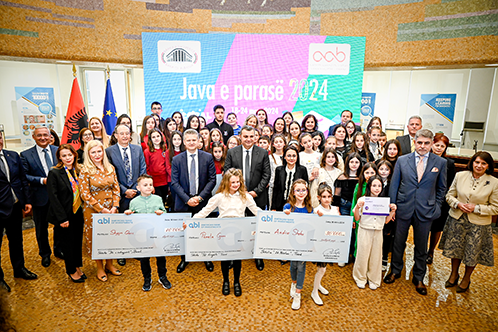
I thank all our partners for their dedication and commitment to advancing financial literacy in Albania. Let us continue to collaborate towards a future that is more financially educated, empowered, and secure.
[1] OECD International Network on Financial Education (INFE).

 Linkedin
Linkedin
 Twitter
Twitter
 Youtube
Youtube
 Facebook
Facebook
 Flickr
Flickr
 RSS
RSS
 Subscribe
Subscribe
 Feedback
Feedback